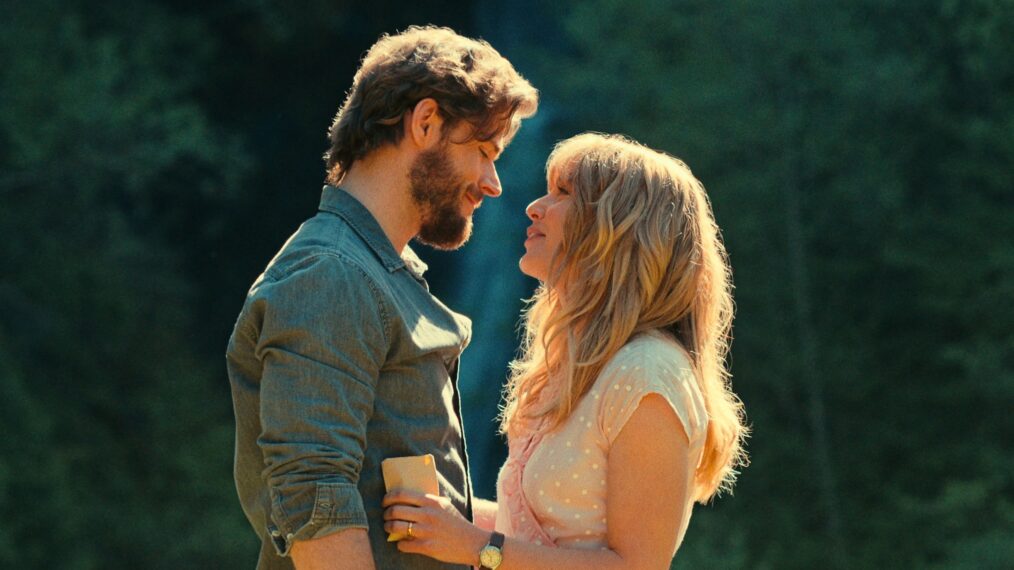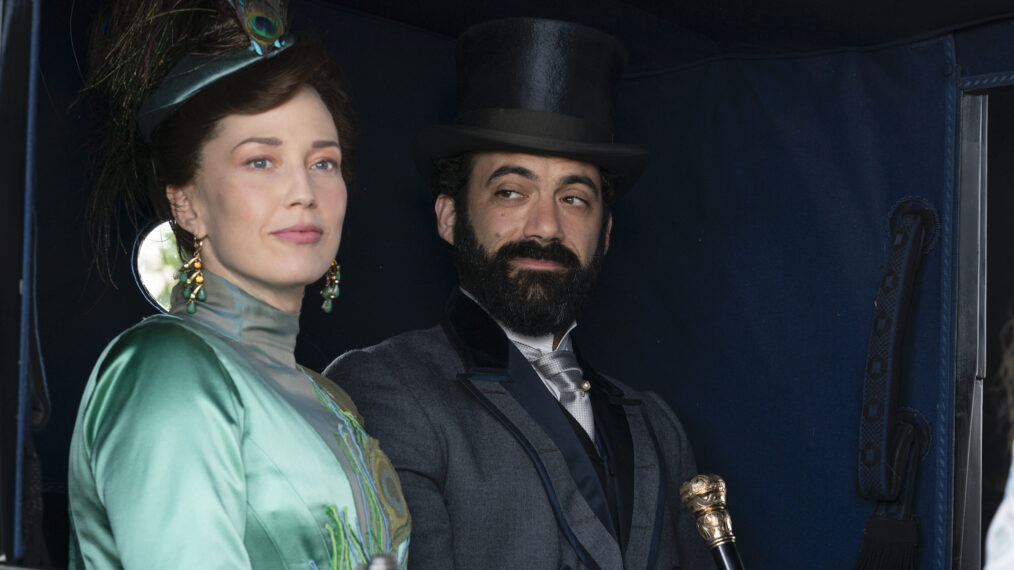Bertha and George Russell clawed their way to the top in The Gilded Age. Now, sitting pretty in their 5th Avenue and 61st Street mansion, the Russells fight for acceptance in their glittering social scene and to keep their empire running. As Season 1 of the HBO drama showed, the power couple is more than up to the task. But what does their shared ambition blind them to?
Here, Carrie Coon and Morgan Spector break down Bertha and George’s relationship with each other, their family, and New York City high society in Season 1, plus what their future obstacles could look like in The Gilded Age Season 2, to TV Insider.
Julian Fellowes and Sonja Warfield’s writing gives you some juicy lines to work with. Does the writing make your jobs easier? In that there’s so much revealing dialogue.
Carrie Coon: With Julian’s writing, there’s always so much more going on under the surface than my initial read, because of the dynamics of the time period, and so sometimes the politics of the scene aren’t clear when I’m just reading it in my room. I find that what I think is going to be difficult isn’t what’s hard. It’s always a scene I wasn’t expecting to be hard.
Certainly, when writing is clean and good it’s easier to work on, and then you’re the only one who’s going to fail. Ultimately, it’s your responsibility not to sink it. And that’s how it feels some of the time, just to make sure you feel like a human being walking around. I’m always rediscovering those dynamics, and it’s hard.
Morgan Spector: He does give you these incredible lines sometimes, where you’re like, ‘God, I can’t believe I got to say this.’ But then also the language itself is very technically demanding to embody and incorporate. But that’s the pleasure of the show, I think, or a big part of it, is playing his language.
I don’t want to blow too much smoke up Julian Fellowes, but when you play Shakespeare, there’s a little bit of a sense of it being really revealing of the actor. There’s something about it that brings out the actual person that you are, and I think Julian’s writing is similar in that way. It invites as much of your essence as you can admit into it.
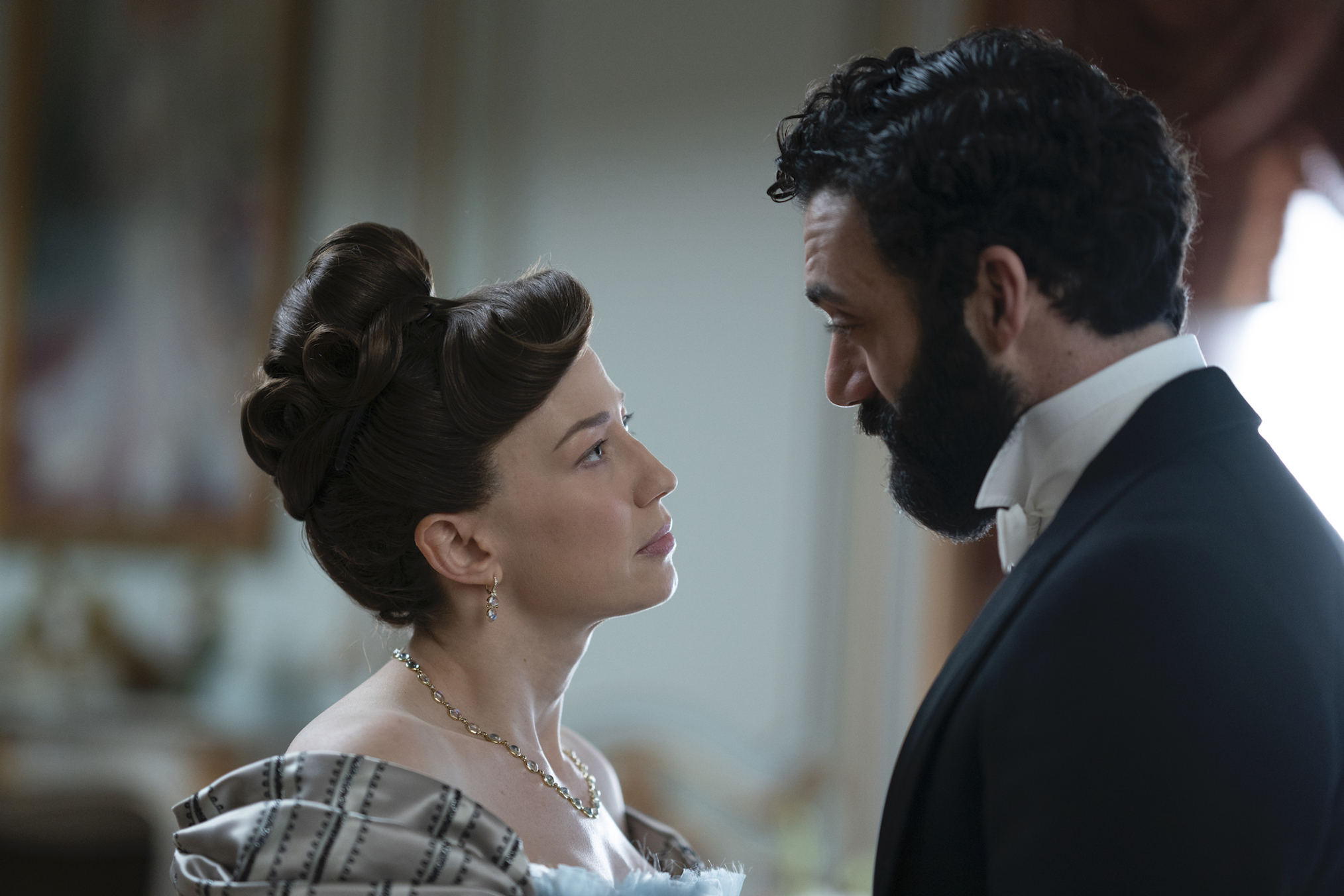
Alison Cohen Rosa/HBO
Given that you get such detailed dialogue, what interesting acting challenges come with developing your characters?
Coon: Everything is heightened. The spaces you’re in, the costume you’re wearing, the language you’re given. And it’s still on camera. Though we’re theatrical people, you still have to feel truthful on camera. Truthfully, I’m not sure I’m always successful at doing that. And that’s the challenge, the fine line between not being shy about embracing the size of the world, and yet also playing it appropriately to camera.
For me, the kind of character that Bertha is (who sometimes can be the antagonist of the piece), sometimes I feel like I’m a Disney villain. There’s something so black-and-white sometimes in terms of what’s on the surface of the scene, but again it’s always more subtle than that. So yes, you have to always have to be reminded of the stakes, but also grounded in the social niceties and choose when you’re revealing something. Sometimes, what you think is helpful to reveal, you actually need to cover. I feel like that’s something I’m always learning in every scene. It’s really hard to do well.
It’s such high camp as well, which I imagine can be hard to make realistic.
Coon: Exactly.
Spector: That is the pleasure of the show. You can’t kill that. You have to lean into it. You don’t want to lose that in some commitment to some mumbling, verité performance, but you do have to walk away feeling like a human being at the end of the day.
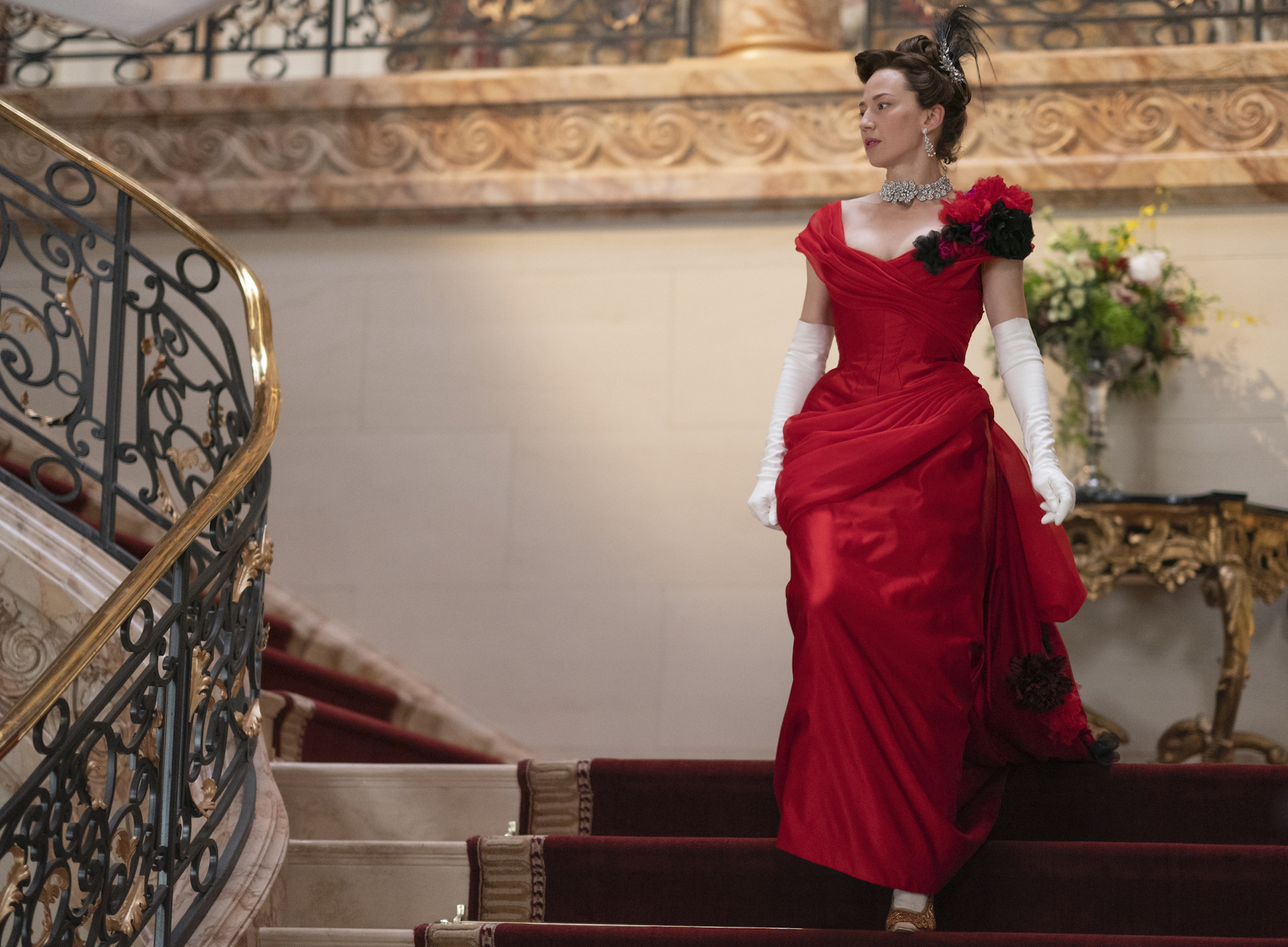
Alison Cohen Rosa/HBO
George and Bertha’s relationship is quite modern for the times. Will we learn more of how they came together and built their empire moving forward?
Spector: I hope so! We could have a whole season where George is dressed as a boot black and he meets Bertha as she’s driving by on a mule.
Coon: They make out in a barn. That sounds really sexy. I think we should write a letter about that.
Spector: OK, yeah. Cool.
Bertha is determined to have Gladys Russell marry someone of high status. Is Bertha seeking out someone who will be just as much of a partner for Gladys as George is for her, or is she seeking out a life where Gladys won’t have to fight to the top like her parents?
Coon: Door number two. What Bertha knows is that the world is not set up for women. If Gladys had any ambition, and it doesn’t appear that she does, she wouldn’t be able to realize it. The world is set up for her son [Larry Russell, played by Harry Richardson]. He’s an attractive, rich, white man. He’s gonna be just fine. And so, some people may quibble with the way Bertha goes about it, because she’s very singleminded, but ultimately what she’s doing is an act of love.
She really wants Gladys to be taken care of, and I don’t think she’s thinking much about Gladys’ happiness. She’s thinking of her material security. It’s a failure of Bertha not to see that her love match is one of the things that sustains her. It’s not something she’s prepared to make space for for her daughter, because she’s too concerned with her survival, frankly.
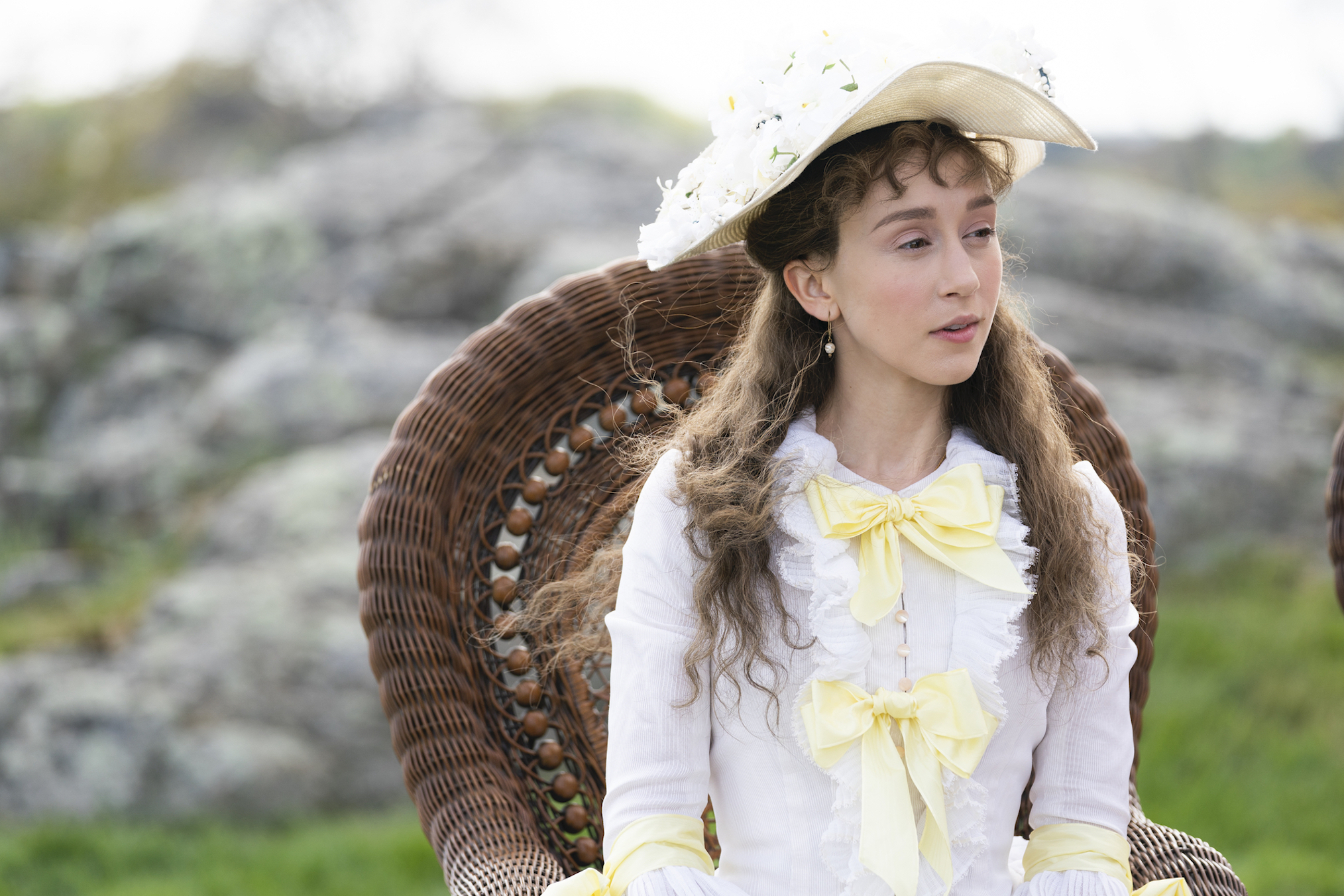
Alison Cohen Rosa/HBO
Spector: I just want to say, one of my favorite bits on set is you in character being horrible to Gladys [both laugh]. Just mocking Taissa [Farmiga] mercilessly.
Coon: Taissa loves it.
Spector: She loves it. It makes her laugh more than anything else. But the fact that it’s worked it’s way into your interviews is just chef’s kiss fantastic [laughs].
Coon: Yes, my children: a dullard and a dilettante. And you know, because we’re rich white people in the Gilded Age, we can have a dullard and a dilettante, and we can make sure they’re set up all right, because we can fail up! Mediocre children can fail up in this world, and still can, frankly. So, not a lot has changed.
Spector: It’s true though. I’ve had conversations in passing with Julian about this. The history of these families was not one of necessarily continued success as the businesses were passed down through the generations. A lot of these men who built these fortunes, they were legitimately brilliant businesspeople, but their kids were raised in total comfort and quite often did not possess the requisite skillset to maintain these empires. These enormous fortunes, many of them did vanish. And so, the dullard and the dilettante I actually think is not an uncommon model.
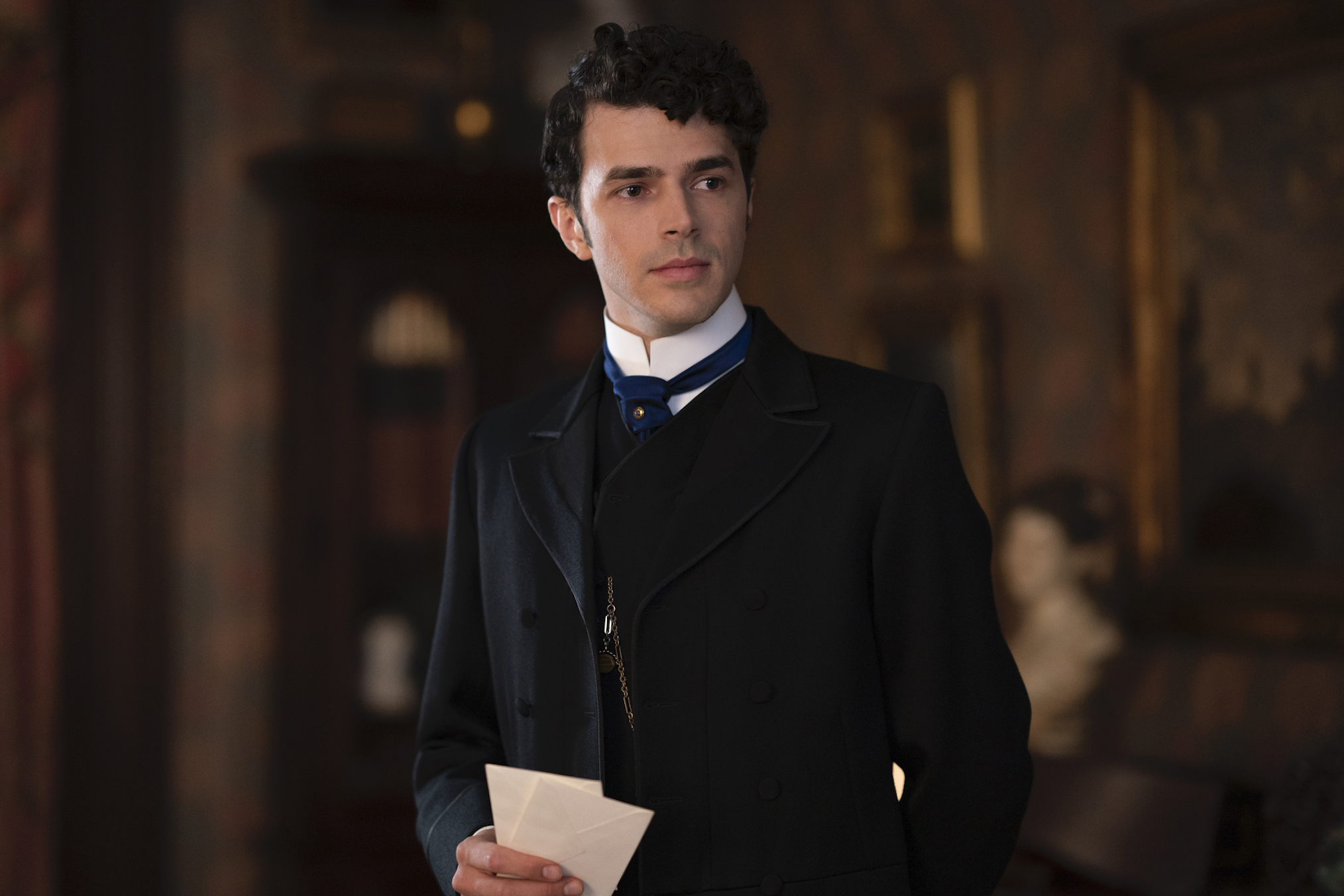
Alison Cohen Rosa/HBO
Coon: No! In fact, we’ve recently seen some in our own country!
Spector: Imagine.
Coon: Some really dull children.
What do you think are George and Bertha’s blindspots as a couple? And what are their biggest strengths?
Coon: Bertha’s not always looking out for you [George]. You know, sometimes you can feel so confident in someone and their ability that you can’t see how they’re struggling.
Spector: Or how they might need you.
Coon: You miss their vulnerability. Yes, how you’re needed. And you take their strength and their confidence for granted because you believe in them so much. It’s easy to overlook when someone needs actual care and attention, and I don’t think Bertha’s always great at that.
Spector: Sure. I think like any entrepreneur, you can get kind of victimized by your own success. Because if you’re able to thrive despite obstacle after obstacle, you might begin to think, “No matter what comes along, I’m going to be OK.” That might mean that you aren’t as proactive at seeking out possible crises and heading them off before they become insurmountable. It’s hard to stay on top.
George Russell is a fierce fighter in his business dealings, but we’ve seen how he can be more nurturing with his family. I wonder if he sometimes doesn’t know when to stop fighting. Do you think that defensiveness is a front?
Spector: I like to think George approaches actual business problems with a relatively lucid frame of mind. I think he tries to evaluate these situations analytically, but he is also quite proud and protective of his family. And so I think there are situations where there’s the social milieu, in which they’re frequently humiliated and mocked, and his business milieu. There are situations where those things overlap, and then I think he’s prone to be a little hotheaded.
Otherwise, I try to chart a course for him — and this is in the writing — where he’s taking advantage of how the system is constructed in order to succeed in it, and he expects that other people are trying to do the same thing. But he also expects that he’s a little more prepared and little better at it than most other people.
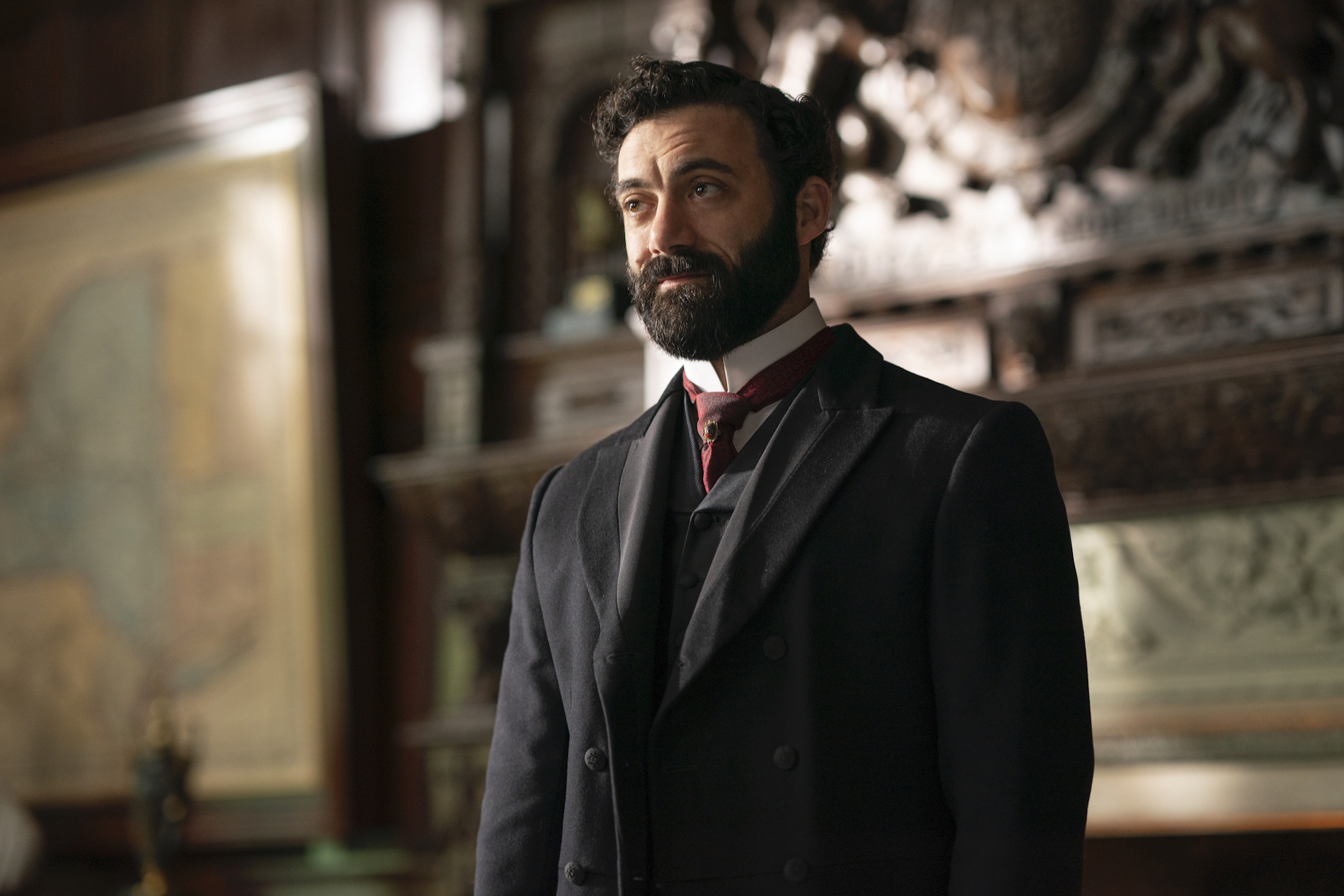
Alison Cohen Rosa/HBO
I’m so excited to see more scenes with you and Donna Murphy. To me, Mrs. Astor won’t be able to help but like Bertha. Do you think the women are a lot alike, and how have you enjoyed scenes with Murphy so far during Season 2 filming?
Coon: Donna is actually really self-deprecating and down to Earth, and yet somehow still imperious even in that regard. She’s the perfect Mrs. Astor.
I think they’re both ambitious. They’ve gone about carving out those spaces for themselves in different ways with different tactics, but ultimately, they’re women who would’ve been in the senate with different styles, and there’s no place for that. They can’t be senators. They can’t be entrepreneurs, and so here they are relegated to the social realm, and they’re going to make the most of it.
We know from history that ultimately, Mrs. Astor did have to let the new money in, because she knew they had enough money to start their own thing that she wouldn’t then be a part of and that all those old families would be excluded from. Mrs. Astor, while she’s hanging on to tradition, is actually quite forward-thinking in the same way that Bertha is. She’s saying the quiet part out loud. And I think that’s where she’s actually an asset to Mrs. Astor, because she’s kind of the bellwether for what’s coming.
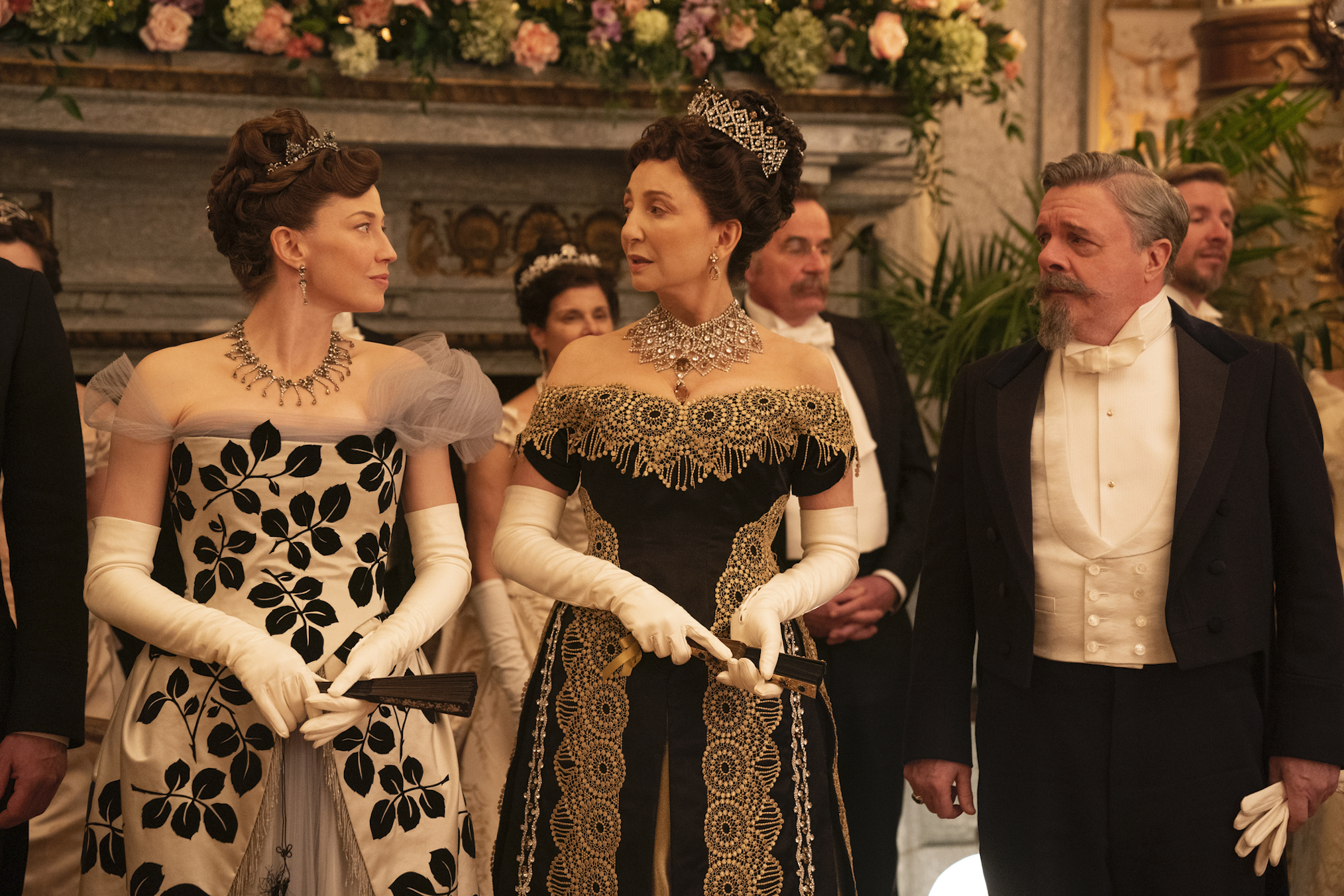
Alison Cohen Rosa/HBO
The Astors are George and Bertha’s white whale. Now that Bertha has an in with Mrs. Astor, do you think she’s as worried about the dynamic with the Van Rhijn/Brook household?
Coon: Bertha is a person that will never be satisfied with where she is. She will set her sights on the biggest obstacle. Perhaps the Van Rhijns are no longer as big an obstacle, but they’re still sticking in her craw a bit.
One of the things I love about, as we continue from Season 1 and enter into Season 2, there’s a feeling of Bertha settling into her power in a new way, even softening into it a little bit — sort of a sign of her security. Secure in her own ambition, but also in her own power, in her own ability. And that’s actually really interesting, because it changes the dynamic in her relationships to people like Agnes Van Rhijn and the way she’s dealing with them. I think Julian’s doing some really smart things in the way he’s shifting those relationships as we go forward.
The Gilded Age Season 1, Streaming Now, HBO Max




























